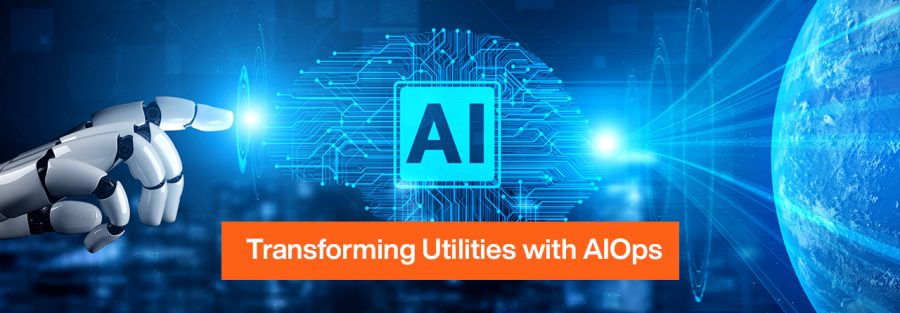Transforming Energy & Utilities Enterprises with AIOps:
The Future of Operational Efficiency and Reliability
Introduction:
In today’s rapidly evolving utilities sector, companies face unprecedented challenges in managing complex operations efficiently and reliably. Enter AIOps (Artificial Intelligence for IT Operations)—a cutting-edge approach that leverages AI and machine learning to enhance IT operations. AIOps is increasingly relevant to the utilities sector, offering advanced solutions to streamline operations, manage vast data, predict maintenance needs, and bolster cybersecurity. This blog explores how AIOps can revolutionize utilities enterprises, driving operational efficiency and reliability.
Pain Points in Utilities Operations:

Operational Inefficiencies:
Utilities companies often grapple with outdated systems and manual processes, which lead to significant inefficiencies and higher operational costs. These legacy systems are not only slow but also prone to human error, making it challenging to maintain optimal performance.
Data Overload:
The utilities sector generates massive amounts of data from various sources, including smart meters, grid sensors, and customer interactions. Managing and making sense of this data in real-time is daunting, often resulting in missed opportunities for operational improvements and enhanced customer service.
Unplanned Downtime and Maintenance Issues:
Unexpected equipment failures and maintenance issues can severely impact service reliability and customer satisfaction. Reactive maintenance practices lead to unplanned downtime, increased repair costs, and strained customer relations.
Cybersecurity Threats:
With the increasing digitization of utilities operations, cybersecurity threats have become a significant concern. Utilities companies must protect their critical infrastructure from cyberattacks while ensuring compliance with stringent regulatory requirements.
Regulatory Compliance and Reporting:
Utilities in the UAE and the rest of the Middle East face strict regulatory requirements and reporting standards. Ensuring compliance can be time-consuming and complex, requiring accurate and timely data management.
Environmental Sustainability Goals:
With growing emphasis on sustainability, utilities are under pressure to reduce their environmental impact. This includes managing energy efficiency, reducing carbon footprints, and adhering to green regulations, which can be challenging without advanced technology.
Resource Scarcity and Management:
The Middle East faces unique challenges regarding water and energy resource scarcity. Efficiently managing these resources while meeting increasing demand requires innovative solutions and real-time operational insights.
How AIOps Addresses These Pain Points:

Automated Processes and Increased Efficiency:
AIOps automates routine IT tasks and optimizes workflows, significantly reducing human error and operational costs. By streamlining processes, utilities can achieve higher efficiency, allowing IT teams to focus on strategic initiatives rather than mundane tasks.
Enhanced Data Management and Real-Time Insights:
AIOps employs AI and machine learning to analyze vast amounts of data in real-time. This capability provides actionable insights that help utilities make informed decisions quickly. Enhanced data management enables better forecasting, resource allocation, and customer service.
Predictive Maintenance and Reduced Downtime:
With AIOps, utilities can move from reactive to predictive maintenance models. By analyzing data patterns, AIOps can predict potential equipment failures before they occur, allowing for proactive maintenance. This approach minimizes unplanned downtime, reduces maintenance costs, and enhances service reliability.
Improved Security Posture:
AIOps enhances cybersecurity by continuously monitoring and analyzing network activity to identify and respond to threats in real-time. This proactive stance ensures the protection of critical infrastructure, safeguarding utilities against cyberattacks and ensuring regulatory compliance.
Streamlined Regulatory Compliance:
AIOps simplifies regulatory compliance by automating data collection, analysis, and reporting. This ensures that utilities can meet regulatory requirements more efficiently, reducing the risk of non-compliance and associated penalties.
Sustainability and Energy Efficiency:
By leveraging AIOps, utilities can optimize energy usage and monitor environmental impact in real-time. AI-driven insights enable utilities to implement energy-saving measures and reduce their carbon footprint, supporting sustainability goals.
Efficient Resource Management:
AIOps provides real-time insights into resource usage and demand patterns, enabling utilities to manage water and energy resources more effectively. This helps utilities address scarcity issues and ensure reliable service delivery.
Use Cases Where AIOps is a Game Changer for Utility Enterprises:
1. Smart Grid Management:
AIOps enables the efficient management of smart grids by analyzing data from various grid sensors in real-time. This allows utilities to optimize energy distribution, quickly identify and resolve outages, and balance supply with demand more effectively. The result is a more reliable and efficient power grid that can adapt to changing conditions and reduce energy wastage.
- Real-time monitoring of grid performance.
- Predictive analytics for outage prevention.
- Dynamic energy distribution based on demand.
- Automated fault detection and resolution.
- Enhanced load balancing capabilities.
- Reduced energy wastage through optimization.
AIOps empowers utilities to create smarter, more responsive grids that not only improve service reliability but also enhance overall efficiency, making it a critical component for future-ready utility operations.
2. Proactive Water Management:
In regions facing water scarcity, AIOps can be crucial in managing water resources. By integrating data from weather forecasts, usage patterns, and sensor networks, AIOps can predict water demand and optimize distribution. This ensures that water resources are used efficiently, reducing wastage and ensuring that supply meets demand even during peak periods.
- Predictive analysis of water demand.
- Real-time monitoring of water distribution.
- Integration of weather forecast data.
- Efficient allocation of water resources.
- Automated leak detection and response.
- Optimization of water usage to reduce wastage.
AIOps facilitates smarter water management, helping utilities in water-scarce regions to optimize resource use and ensure sustainable water distribution.
3. Enhanced Customer Experience:
AIOps can revolutionize customer service in the utilities sector by providing personalized, real-time responses to customer inquiries and issues. AI-driven chatbots and automated support systems can handle routine queries, while predictive analytics can identify potential service disruptions before they affect customers. This proactive approach enhances customer satisfaction and reduces the burden on customer support teams.
- Personalized, AI-driven customer support.
- Real-time response to customer inquiries.
- Predictive analytics for service disruption prevention.
- Automated handling of routine queries.
- Enhanced customer satisfaction and engagement.
- Reduced workload for customer support teams.
AIOps enables utilities to offer superior customer service, enhancing customer satisfaction and loyalty while streamlining support operations.
Conclusion:
AIOps represents a transformative approach for utilities enterprises, addressing critical pain points and driving operational excellence. By adopting advanced technologies like AIOps, utilities can stay competitive, meet growing industry demands, and deliver exceptional service to their customers.
Discover how CloudJune’s AIOps solutions can help your utilities company achieve operational excellence. Contact us at hello@cloudjune.com for more details and to schedule a free consultation.




